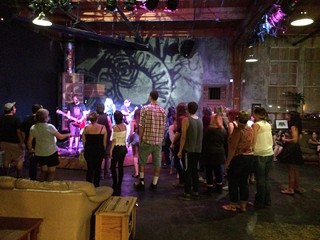In June 2013, members of the local music scene applauded changes to the city's noise ordinance following a judge's ruling that the previous code was too vague. In that case, neighbors had complained that the now-closed Horned Hand, a popular music venue, was too loud—and police issued a $500 citation.
But, at the time, a municipal judge threw out the citation against the Horned Hand, and sent the message to the city and police that they needed more concrete evidence to enforce the noise ordinance—something more objective than a neighbor griping, like actual readings from a decibel meter showing that sound levels were outside the allowed parameters.
In response, City Council crafted a compromise of sorts; the year-old ordinance requires the use of decibel meters—in certain circumstances—to determine whether a business is violating allowed noise levels, creates a permitting process for exemptions and grants broad leeway to outdoor venues like Les Schwab Amphitheater.
But, if recent complaints and citations are any measure, it seems as if enforcement of the noise ordinance is sagging back toward "too vague." In particular, Derek Sitter, owner of Volcanic Theatre Pub, says a decibel meter was not used in the citation he received on July 11.
"We were part of this music art coalition trying to get an objective reading of the ordinance, we thought we accomplished that," Sitter explains. But the night he received the citation—when rock band Black Pussy was performing to a packed crowd—Sitter says he was taking regular readings with his own decibel meter in the alley on Commerce Avenue, and the reading was always under 60 decibels, the limit for noise after 10 pm.
When the officer showed up at the venue, Sitter says, he had already written the citation. Sitter asked about the decibel reading and claims the officer told him that decibel readings no longer apply after 10 pm—a response that surprised Sitter.
When the code was revised last year, council added a provision requiring citations issued under 5.50.025, section B7 to use a decibel meter. City Recorder Robyn Christie says that citations made under other sections do not have this requirement. While Sitter says he's not certain what section he was cited under, the revised portion of the ordinance would seem to apply. It reads (emphasis added):
"Using, operating or permitting to be used or operated a mechanical or electrical speaker or amplifier, either stationary or mobile, that creates noise that is plainly audible at the property line of a property with a residence or noise-sensitive unit, other than the property where the noise is generated, between the hours of 10:00 p.m. and 7:00 a.m. This section applies to any noise generated by a speaker or amplifier, regardless of whether the sound is generated on private or public property. If the amplified noise originates from a commercial establishment, a noise meter reading shall be taken as additional evidence relating to the alleged violation."
Patrol Cpt. Ben Gregory confirms that decibel meters are not necessarily required to issue a citation and that, furthermore, they cannot reliably detect bass—a common source of noise complaints.
"We can't really measure it, but it's disruptive," Cpt. Gregory says, adding that it shakes windows and disrupts sleep. He couldn't say if bass was to blame in Volcanic's citation.
Volcanic was cited under noise ordinance section 5.50.025—one of 13 such citations issued since July 1, 2013, according to the Bend Municipal Court. That portion of the ordinance prohibits noise over 60 decibels past 10 pm, as well as noise created in a public place "that is unnecessarily loud at a distance of 50 feet." The ordinance defines "unnecessarily loud" as "any sound that interferes with normal spoken communication or that could reasonably disturb sleep."
Though Sitter disagrees with the subjectivity of the citation, he didn't feel he could plead not guilty. The officer told him that "if the woman could hear a kick drum at her residence, no matter the decibel, I'm in violation," he explains.
When volume levels are measured by personal perception rather than a decibel meter, Sitter says similar circumstances can lead to different results. The night after Sitter received the citation, he says another officer came by during the Diego's Umbrella show, following up on a complaint.
"He sat on Commerce, didn't hear a peep, and left," Sitter says. "It's subjective to which officer and which neighbor."
One night, he says, a woman in the neighborhood called him directly to complain, saying she was disturbed by the sound of a drum. Sitter told the woman that he only had a single guitarist on stage and that she was likely hearing the concert at Les Schwab Amphitheater. When she asked if she should call them to complain, he said, "Good luck." The ordinance provides an exemption for "amplified or non-amplified sound generated at concerts at an outdoor amphitheater with a capacity of at least 5,000 people" between 7 and 10 pm. The city also has a permitting process for events seeking additional exemptions.
Ultimately, Sitter says he was able to whittle his fine down from $250—the minimum for a first time offense—to $150 by showing the judge receipts for $4,000 worth of air conditioning, a purchase he made so he wouldn't have to open doors on summer nights and risk letting sound escape with the hot air.
But Sitter may not be able to control one of the factors driving police to his address—his neighbor. Also located at 70 SW Century Dr. is GoodLife Brewing, a brewpub with a patio and tin siding that sometimes holds concerts in its parking lot.
"The officer said in the [first] 20 days of summer, between me and GoodLife, they had 15 complaints," Sitter says.
Cpt. Gregory confirms this, adding that, from where he sits, it's hard to parse out the complaints for one location from the other. He says dispatch should have clearer details, but they did not respond to a request for information by press time.
"Some of the complaints are specific, some just say courtyard," Cpt. Gregory says, adding that while he believes a warning was issued, he can't say for sure if it was issued to Volcanic or Good Life. He says police try to issue warnings first and work with businesses to achieve compliance before issuing citations.
Sitter says he has never received a warning, but he's hoping the air conditioning will help him avoid any future problems. That, and giving City Council a piece of his mind and perhaps, come November, a run for their money. He says artists need representation in the face of push back from neighbors who may be resistant to change. (Though he has begun collecting signatures, Sitter has not yet filed the paperwork to run for office.)
"We've grown and some people who've been living in that neighborhood for 40 years don't like that," Sitter explains. "If it's the same woman calling in every time, I'm gonna go and say there's gotta be a reasonable level for her to complain. There has to be a limit. How many times can she call and there's not an issue?"



























